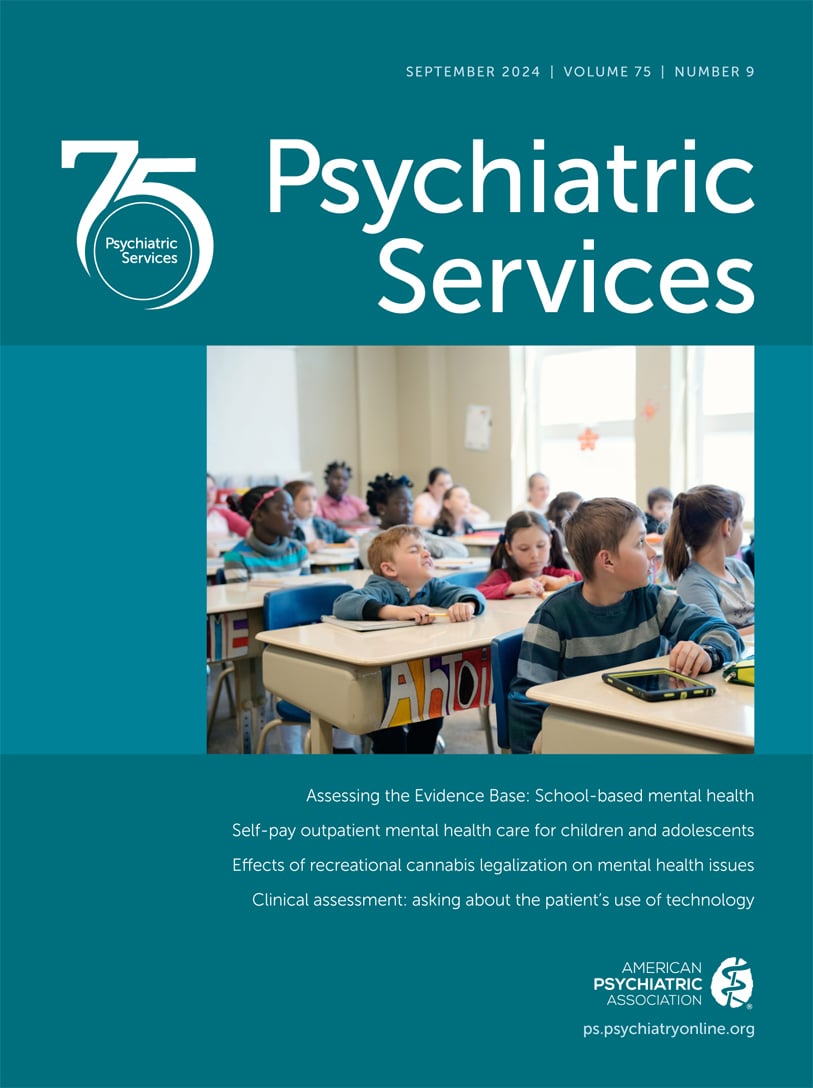Psychiatric Services
- Volume 71
- Number 1
- January 2020
Taking Issue
Viewpoint
Articles
Publication date: 25 September 2019
Pages4–11Objectives: The study objective was to assess the impact of Medicaid expansion on health and employment outcomes among enrollees with and without a behavioral health disorder (either a mental or substance use disorder). Methods: Between January and October ...
https://doi.org/10.1176/appi.ps.201900179Publication date: 02 October 2019
Pages12–20Objective: The study measured the association between local opioid problem severity and changes in the availability of substance use disorder treatment programs, including the distance required for travel to treatment. Methods: A two-part, multivariable ...
https://doi.org/10.1176/appi.ps.201900150Publication date: 02 October 2019
Pages21–27Objective: The objective was to examine mental health treatment access disparities between Asians and whites in the United States as well as the role of perceived and objective need and barriers to treatment in these disparities. Methods: Data are five ...
https://doi.org/10.1176/appi.ps.201900126Publication date: 16 September 2019
Pages28–34Objective: High clinician turnover in community behavioral health settings can lead to increased costs and can have a negative impact on care quality. Few studies have examined the implications of clinician turnover for client outcomes. This study ...
https://doi.org/10.1176/appi.ps.201900169Publication date: 10 September 2019
Pages35–42Objective: Substance use disorder treatment professionals are paying increased attention to implementing patient-centered care. Understanding environmental and organizational factors associated with clinicians’ efforts to engage patients in clinical ...
https://doi.org/10.1176/appi.ps.201900121Publication date: 25 September 2019
Pages43–48Objective: This study aimed to assess parents’ satisfaction with the primary care provider (PCP) in the treatment of their child’s mental health problems after the PCP consulted with the Massachusetts Child Psychiatry Access Program (MCPAP). It studied how ...
https://doi.org/10.1176/appi.ps.201800324Publication date: 16 October 2019
Pages49–56Objective: This study built on research comparing a mobile health intervention (FOCUS) and a clinic-based intervention (Wellness Recovery Action Planning [WRAP]) for self-management of serious mental illnesses. Qualitative interviews were conducted to ...
https://doi.org/10.1176/appi.ps.201900110Reviews & Overviews
Publication date: 10 September 2019
Pages57–74Objective: This systematic review examined the impact of health homes on cardiometabolic risk among adults with serious mental illness. Methods: The Preferred Reporting Items for Systematic Reviews and Meta-Analyses procedures were used to conduct the ...
https://doi.org/10.1176/appi.ps.201800563Brief Reports
Publication date: 08 October 2019
Pages75–78Objective: This study examined whether communication between inpatient and outpatient mental health providers during patients’ inpatient stays was associated with whether patients attended postdischarge appointments. Methods: Psychiatric inpatient medical ...
https://doi.org/10.1176/appi.ps.201900233Publication date: 25 September 2019
Pages79–82Objective: This study compared clinician contact with clients’ caregivers by service setting, specifically schools, which are the most common service setting for youths. Methods: Data were from a state-funded cognitive-behavioral therapy training initiative. ...
https://doi.org/10.1176/appi.ps.201900160Publication date: 02 October 2019
Pages83–86Objective: The aim of this systematic review and meta-analysis was to examine the prevalence of voluntary and involuntary psychiatric admissions for severe mental illness in China and explore their associated factors. Methods: The PubMed, Cochrane Library, ...
https://doi.org/10.1176/appi.ps.201900106Editor's Choice
Social Determinants of Mental Health
Publication date: 08 October 2019
Pages89–91Many people with serious mental illnesses live in poverty, which can worsen mental and overall health. The authors suggest strategies to improve health outcomes through behavioral health services and supports that directly target financial wellness while ...
https://doi.org/10.1176/appi.ps.201900323Promoting High-Value Mental Health Care
Publication date: 08 October 2019
Pages92–95Computer simulation using JaamSim tested the impact of changing the number of providers, proportion of independent to supervised providers, shift provider added, time to hospitalization, and the number of beds in order to identify bottlenecks in a ...
https://doi.org/10.1176/appi.ps.201900040Research, Community, & Services Partnerships
Publication date: 16 October 2019
Pages96–99This column describes the development of a partnership between health care, housing, and intellectual disability services to support efforts by homeless adults with intellectual disabilities to exit homelessness. Applying a Housing First approach and ...
https://doi.org/10.1176/appi.ps.201800590State Mental Health Policy
Publication date: 08 October 2019
Pages100–104Earmarking taxes for behavioral health services is a policy strategy that many jurisdictions have implemented to increase funding for behavioral health systems. However, little has been written about these taxes, and limited guidance exists for policy ...
https://doi.org/10.1176/appi.ps.201900332Editor’s Choice Collections
Past Issues
View Issues Archive
Vol. 75 | No. 12

Vol. 75 | No. 11

Vol. 75 | No. 10
